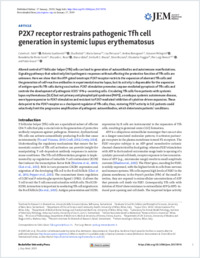P2X7 receptor restrains pathogenic Tfh cell generation in systemic lupus erythematosus
- Faliti, Caterina E. Institute for Research in Biomedicine (IRB), Faculty of Biomedical Sciences, Università della Svizzera italiana, Switzerland - Graduate School for Cellular and Biomedical Sciences, University of Bern, Bern, Switzerland
- Gualtierotti, Roberta Department of Clinical Science and Community Health, University of Milan, Milan, Italy - Lupus Clinic, IASST-Istituto Gaetano Pini, Milan, Italy
- Rottoli, Elsa Institute for Research in Biomedicine (IRB), Faculty of Biomedical Sciences, Università della Svizzera italiana, Switzerland - Department of Medical Biotechnology and Translational Medicine, University of Milan, Milan, Italy
- Gerosa, Maria Department of Clinical Science and Community Health, University of Milan, Milan, Italy - Lupus Clinic, IASST-Istituto Gaetano Pini, Milan, Italy
- Perruzza, Lisa Institute for Research in Biomedicine (IRB), Faculty of Biomedical Sciences, Università della Svizzera italiana, Switzerland - Graduate School for Cellular and Biomedical Sciences, University of Bern, Bern, Switzerland
- Romagnani, Andrea Institute for Research in Biomedicine (IRB), Faculty of Biomedical Sciences, Università della Svizzera italiana, Switzerland - Graduate School for Cellular and Biomedical Sciences, University of Bern, Bern, Switzerland
- Pellegrini, Giovanni Laboratory for Animal Model Pathology, Institute of Veterinary Pathology, Vetsuisse Faculty, University of Zurich, Zurich, Switzerland
- De Ponte Conti, Benedetta Institute for Research in Biomedicine (IRB), Faculty of Biomedical Sciences, Università della Svizzera italiana, Switzerland - Department of Medical Biotechnology and Translational Medicine, University of Milan, Milan, Italy
- Rossi, Riccardo L. Istituto Nazionale Genetica Molecolare “Romeo ed Enrica Invernizzi” Milan, Italy
- Idzko, Marco Division of Pulmonology, Department of Medicine II, Medical University of Vienna, Vienna, Austria
- Mazza, Emilia M.C. Department of Life Sciences, University of Modena and Reggio Emilia, Modena, Italy
- Bicciato, Silvio Department of Life Sciences, University of Modena and Reggio Emilia, Modena, Italy
- Traggiai, Elisabetta Novartis Institute for Biomedical Research, Basel, Switzerland
- Meroni, Pier Luigi Department of Clinical Science and Community Health, University of Milan, Milan, Italy - Lupus Clinic, IASST-Istituto Gaetano Pini, Milan, Italy - Istituto Auxologico Italiano, Milan, Italy
- Grassi, Fabio Institute for Research in Biomedicine (IRB), Faculty of Biomedical Sciences, Università della Svizzera italiana, Switzerland - Department of Medical Biotechnology and Translational Medicine, University of Milan, Milan, Italy - Istituto Nazionale Genetica Molecolare “Romeo ed Enrica Invernizzi,” Milan, Italy
-
17.01.2019
Published in:
- Journal of Experimental Medicine. - 2019, vol. 216, no. 2, p. 317-336
English
Altered control of T follicular helper (Tfh) cells can lead to generation of autoantibodies and autoimmune manifestations. Signaling pathways that selectively limit pathogenic responses without affecting the protective function of Tfh cells are unknown. Here we show that the ATP-gated ionotropic P2X7 receptor restricts the expansion of aberrant Tfh cells and the generation of self-reactive antibodies in experimental murine lupus, but its activity is dispensable for the expansion of antigen-specific Tfh cells during vaccination. P2X7 stimulation promotes caspase-mediated pyroptosis of Tfh cells and controls the development of pathogenic ICOS+ IFN-γ– secreting cells. Circulating Tfh cells from patients with systemic lupus erythematosus (SLE) but not primary antiphospholipid syndrome (PAPS), a nonlupus systemic autoimmune disease, were hyporesponsive to P2X7 stimulation and resistant to P2X7- mediated inhibition of cytokine-driven expansion. These data point to the P2X7 receptor as a checkpoint regulator of Tfh cells; thus, restoring P2X7 activity in SLE patients could selectively limit the progressive amplification of pathogenic autoantibodies, which deteriorate patients’ conditions.
- Language
-
- English
- Classification
- Medicine
- License
- Open access status
- hybrid
- Identifiers
-
- RERO DOC 324106
- DOI 10.1084/jem.20171976
- ARK ark:/12658/srd1318816
- Persistent URL
- https://n2t.net/ark:/12658/srd1318816
Statistics
Document views: 186
File downloads:
- Pdf editoriale: 251
